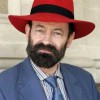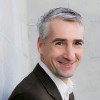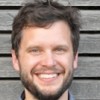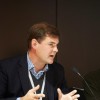Limits and potential of neuroscience
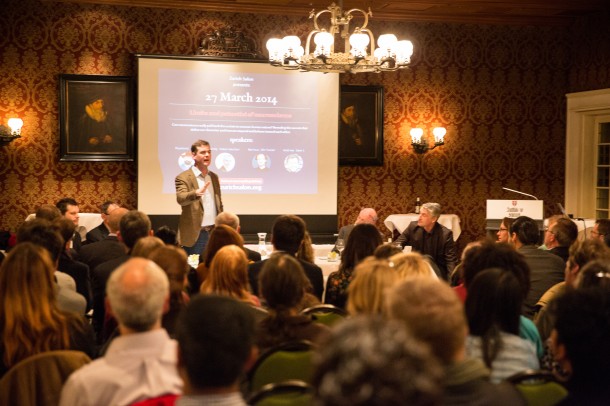
The Zurich Salon on the “limits and potential of neuroscience” attracted an audience of more than 100 people on a Thursday night.
Angus Kennedy (standing) opened proceedings by outlining why it is that Enlightenment-style Salons are making a comeback. He said their objective was to encourage free-thinking and dissent, and to spark public conversations on the key issues facing society. He stressed that Salons foster an atmosphere of intellectual freedom, and the open-ended exploration of the ideas that are shaping policy and culture.
Scoping the neuroscience Salon
Does modern brain-scanning technology provide insights that correlate meaningfully with our emotions, intentions, and feelings? Does our ability to illuminate the mind within the brain spotlight our innermost thoughts and reveal the sources of our deepest desires?
Neuroscience has sparked the imagination of policy makers, marketeers, pollsters, communicators, artists and lawyers. They claim neuroscience explains everything from why consumers make certain choices to why people vote left or right. Some maintain it can fathom why some of us are prone to rebellion, and why we prefer one form of art over another. Increasingly, lawyers argue that clients shouldn’t be held responsible for committing heinous crimes because they were born with (or an accident caused) faulty neurological circuitry.
Are those calling for a radical neuro-transformation of criminal responsibility, education, public health and social policy too credulous about what some term ‘neuromania’? Or is scepticism about neuroscience driven by a myopic refusal to accept that we are less autonomous than we think?
The neurophilosopher Patricia Churchland in Me, Myself and My Brain argues that “I am who I am because my brain is what it is”. Psychotherapist Sue Gerhardt writes about Why Love Matters: How Affection Shapes a Baby’s Brain.
The psychiatrist Sally Satel counters that people like them have been Brainwashed by the seductive appeal of mindless neuroscience. Raymond Tallis says his groundbreaking science is being misused to undermine notions of free will and to promote crude determinism.
Has the explanatory power of neuroscience been overestimated? Or is it the key to reading our minds?
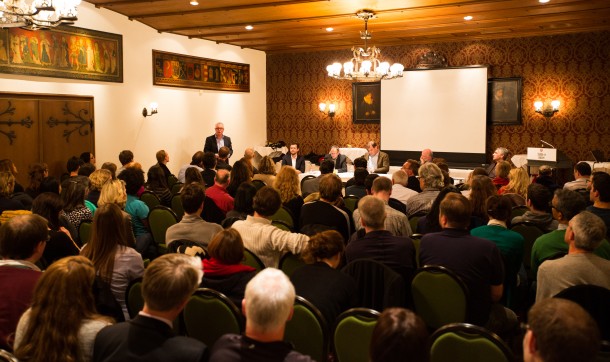
Recommended reading:
-
Neuro-backlash? What backlash?
Sally Satel and Scott O. Lilienfeld, Rationally Speaking
We don’t see any neuroscience backlash threatening to toss out the neuroscientific baby with the brain-water. And we’re glad about that. What we do see, however, is value in examining the language people use when talking about the relationship between the brain and the mind. -
Neuroleadership: A Journey Through the Brain for Business Leaders
Argang Ghadiri, Andreas Habermacher, Theo Peters
Provides an introduction to neuroleadership. It takes the reader through its history, foundations and place in the modern business world. Rethinking the paradigm of neuroleadership and proposing the basic needs model at the heart of organisational and leadership success. -
Aping Mankind: Neuromania, Darwinitis and the Misrepresentation of Humanity
Raymond Tallis
To explain everyday behaviour in Darwinian terms denies human uniqueness and offers a grotesquely simplified and degrading account of humanity. We are infinitely more interesting and complex than we appear in the mirror of biologism. -
Exploiting neuroscience lessons to shape policy
Matthew Taylor (RSA Chief Executive)
The [UK] Cabinet Office has a team which uses an understanding of automatic cognitive processes to encourage - or "nudge" - us to make what government believes are wider and more pro-social choices. -
Probing the neuroscience of a rebellious streak
Evolutionary biologist Dr Vasily Klucharev at the University of Basel claims that it is possible to identify rebels and conformists by studying what’s happening in their brain when under pressure from the crowd. -
(video) 3 clues to understanding your brain
Vilayanur Ramachandran
(video) Vilayanur Ramachandran tells us what brain damage can reveal about the connection between celebral tissue and the mind, using three startling delusions as examples. He looks deep into the brain’s most basic mechanisms. By working with those who have very specific mental disabilities caused by brain injury or stroke, he can map functions of the mind to physical structures of the brain. -
(video) Soul on the slab: is there no limit to what neuroscience can do?
Julian Baggini, Dr Bill Durodié, Professor Geraint Rees, Dr Sally Satel
Has the explanatory power of neuroscience been overestimated? -
The neuromyths of the classrooms
Philip Ball
Neuroscience is shaping up to be a fierce battleground for how we should organise our societies, as Prospect has predicted in the past. Gender differences, criminal law, political persuasions—we should be prepared to tackle difficult questions about whether or not “our brains make us do it.” To judge from some commentaries, the more established psychological frameworks such as Freudianism and Kleinianism traditionally used to decipher behaviour such as dysfunction, trauma and intelligence—are about to be replaced with the MRI scanner.
